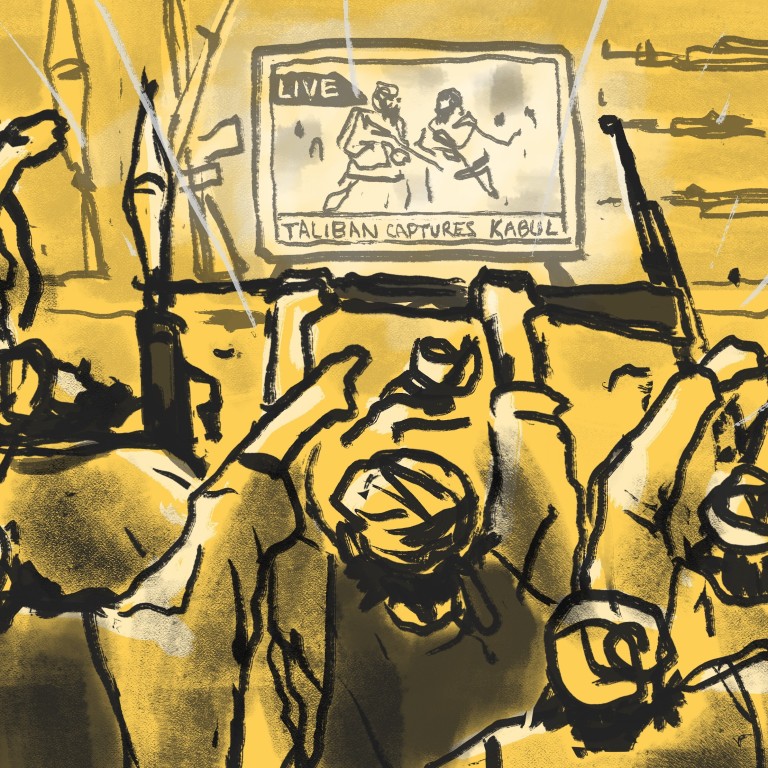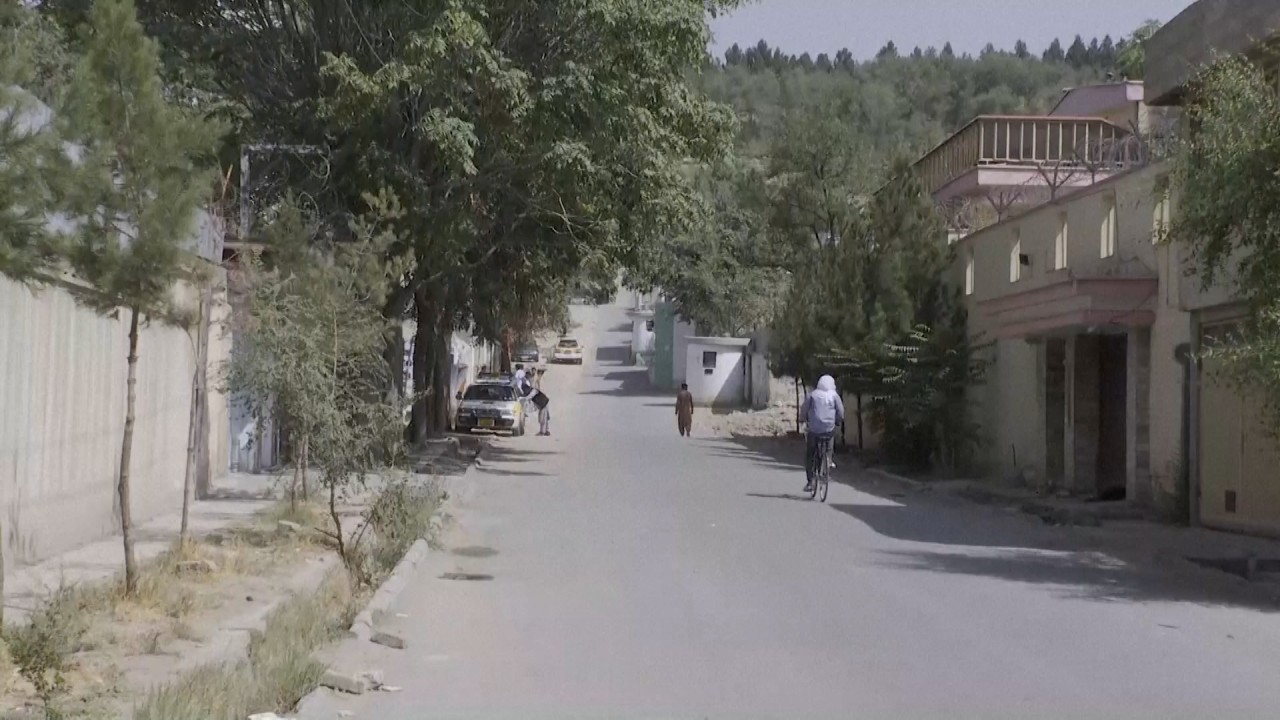
How the Taliban’s success in Afghanistan could threaten China’s interests in Africa
- Groups such as Boko Haram in Nigeria and al-Shabab in Somalia may seek to build ties with the Afghan group after the fall of Kabul
- China’s extensive interests across the continent could be threatened, Beijing is unlikely to want to replace the US in a security role
The deadly terrorist attacks against the United States on September 11, 2001, prompted an outcry from around the world: “We are all Americans.” Washington’s policies realigned around fighting terrorism and bilateral relationships strengthened or crumbled depending on where other governments stood. As part of a series about the legacy of September 11, Jevans Nyabiage looks at the implications for China in Africa from the Taliban’s return to power in Afghanistan.
“Africa is the new front line of global militancy,” Buhari wrote in an opinion piece in the Financial Times.

02:08
Afghan arms dealers have huge surplus of abandoned weapons after Taliban takeover
“Mozambique is merely the latest African state in danger from terrorism,” he wrote. “The Sahel remains vulnerable to Boko Haram, 20 years after its formation, and other radical groups,” he said, referring to a semi-arid region in North Africa. “Somalia is in its second decade fighting the equally extreme al-Shabab.”
As the clock counts down to the 20th anniversary of the September 11 attacks in the United States, America and its allies are on alert for threats to US embassies and installations.
These dangers also have broader implications for China, which has extensive interests and investments in Africa and is extending its international reach. But observers say Beijing is unlikely to want to take on a bigger security role in the region to contain them.
After 9/11: how China cracked down at home in global fight on terror
Samuel Ramani, an Oxford University international relations specialist, said al-Shabab had praised the Taliban’s triumph in Afghanistan “and this has fuelled fears in Somalia that the Taliban might cooperate with al-Shabab”.
“Similar fears about a Taliban-Boko Haram alliance are also swirling in Nigeria,” he said.
While the militant Islamist groups operating in Africa lacked the legacy and organisational structure of the Taliban, they were likely to be emboldened by the prospect of seizing control of a weak state, said Joseph Siegle, research director for the Africa Centre for Strategic Studies.
“This has most relevance in Somalia with al-Shabab and in the Sahel, particularly Mali and Burkina Faso, vis-à-vis the Macina Liberation Front and Islamic State in the Greater Sahara,” Siegle said.
“I don’t believe the militant groups in the Sahel are cohesive enough to sustain a push to control the respective countries. Al-Shabab, meanwhile, could very well seize control of Somalia if the African Union Mission to Somalia and international forces were to depart.”

04:51
Thousands fleeing Afghanistan struggle to enter Kabul airport
Mohammed Soliman, from the Middle East Institute, said: “The success and speed of [the Taliban’s] nationwide offensive will boost extremist groups worldwide, from Boko Haram to al-Shabab and from Isis to al-Qaeda.”
Despite the growing threats in Africa, former US president Donald Trump last year ordered the withdrawal of US troops from Somalia, which has been hit by attacks from al-Shabab, an affiliate of al-Qaeda.
The trend is likely to alarm Beijing, which has wide-ranging economic interests in Africa – ranging from mineral extraction to infrastructure projects – that are threatened by instability.
Taliban’s return ‘boosts morale’ of militant groups in Southeast Asia
For instance, armed Islamist militants recently attacked Mozambique’s gas-rich Cabo Delgado region, where the state-owned China National Petroleum Corporation has interests.
Growing insecurity in Africa could also force Beijing to increase its role in providing security.
Ramani said China had been paying greater attention to the Horn of Africa and the Red Sea, as it viewed the region as a gateway to the Indian Ocean.
“China’s drills with Saudi Arabia on the Red Sea and troubleshooting efforts between Eritrea and Djibouti show that it is not averse to embracing a security role in this region,” Ramani said.
Is Somalia the Pentagon’s new ‘endless war’?
“I think that China will intervene only if its Belt and Road Initiative assets and nationals are under threat,” Ramani said.
But he thought it unlikely that China would engage in protracted nation-building or counterterrorism campaigns. “So, if France withdraws from West Africa, China won’t step in to replace it, and it is unlikely to do much heavy lifting in Somalia either,” Ramani said.

01:05
Upscale Kabul neighbourhood nearly deserted after Taliban takes control
David Shinn, a professor at George Washington University’s Elliott School of International Affairs, said that China might try to engage more economically but would be reluctant to replace the US in a security role.
“China seeks greater influence in Africa but is not interested in kinetic military activity. Support for UN peacekeeping operations, military sales and some military training are about the only steps that China will take,” Shinn said.
Soliman said China might provide more training for countries affected by terrorism but it had “been historically conservative with overseas deployments” and was unlikely to try to replace US forces.
Iran, China vow security cooperation after Taliban’s Afghan takeover
Chinese policymakers will also be wary of expanding their military role from peacekeeping operations, according to Richard Gowan, UN director of the International Crisis Group.
“Chinese peacekeepers have already lost their lives in Mali and South Sudan. In debates at the United Nations, China has emphasised the importance of keeping UN troops safe.
“So, I don’t see Beijing embracing the much greater risks of counter-insurgency and counterterrorist missions lightly,” he said.

Gowan said China and Western powers would increasingly push African countries to take the lead “as we have seen the Rwandans do in Mozambique. I think China is more likely to offer military supplies and advice than to put lots of its troops in danger”.
Last month Liu Yuxi, China’s head of mission to the African Union, marked the anniversary of the founding of the People’s Liberation Army by highlighting China’s role in Africa, including sending more than 40,000 peacekeepers to take part in various operations over the years.
He said about 80 per cent of China’s military peacekeepers, or nearly 2,000 service personnel, were deployed in Africa.
Liu also said China’s navy had escorted nearly 7,000 Chinese and foreign vessels through the troubled waters off Somalia, while Beijing has pledged US$100 million worth of military aid and an additional US$80 million to the African Union.
Jeffrey Becker, director of the Indo-Pacific Security Affairs Programme at the Centre for Naval Analyses, said: “While it remains to be seen what future role the PLA will play in Africa, should a growing Islamist insurgency on some parts of the continent threaten those interests, the People’s Republic of China has certainly positioned its military to respond.”
The deadly terrorist attacks against the United States on September 11, 2001, prompted an outcry from around the world: “We are all Americans.” Washington’s policies realigned around fighting terrorism and bilateral relationships strengthened or crumbled depending on where other governments stood. As part of a series about the legacy of September 11, Jevans Nyabiage looks at the implications for China in Africa from the Taliban’s return to power in Afghanistan.








